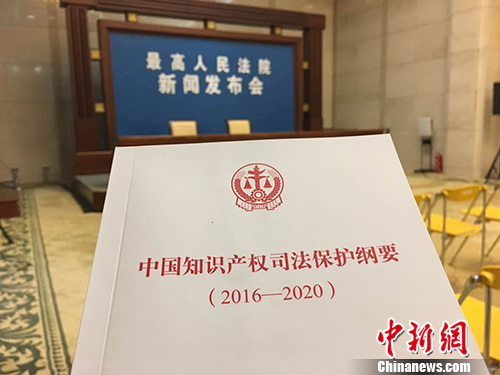How to solve the problem of "low compensation" in intellectual property cases? The Supreme Court responded like this
BEIJING, Beijing, April 24 (Shang Qi) In view of the relatively low compensation for intellectual property rights infringement, Song Xiaoming, president of the Intellectual Property Court of the Supreme People’s Court, said on the 24th that a fair, reasonable and proportional compensation system for intellectual property rights damages will be established, and punitive compensation system will be stipulated in copyright law, patent law and anti-unfair competition law to increase the legal compensation for intellectual property rights infringement.

On the morning of 24th, the Supreme People’s Court held a press conference in Beijing to launch the 2017 National Intellectual Property Judicial Protection Publicity Week, and released the Outline of Intellectual Property Judicial Protection in China (2016— 2020)》。
The reporter of Zhongxin. com noted that the outline put forward 8 main objectives and 15 key measures, and strived to improve the judicial protection system of intellectual property rights, greatly enhance the judicial protection ability and make the leading role of judicial protection more prominent through five years’ efforts.
In the practice of intellectual property cases, low compensation is a prominent problem in society. In this regard, Song Xiaoming revealed, "In 2015, Guangdong established the Supreme Court’s intellectual property market value research base, and the current progress of this topic is relatively smooth, that is, how to realize the market value orientation of intellectual property rights and determine the compensation amount of intellectual property rights."
Aiming at the problem of low compensation, the outline also makes plans — — Establish a scientific and reasonable system of compensation for intellectual property damage, and establish a system of compensation for the losses suffered by the obligee, the benefits obtained by the infringer, the license fee, the statutory compensation and the cost of rights protection that is compatible with the value of intellectual property.
The key measures in the outline are: vigorously carry forward the concept of respecting knowledge and talents. Insisting that intellectual property creates value, the obligee should enjoy the return of interests, and infringing on intellectual property is the value orientation of infringing on others’ personal rights and property rights. Establish a fair, reasonable and proportional compensation system for intellectual property damage, focusing on compensation and supplemented by punishment, so that the rights holder’s interests can be compensated, the infringer is unprofitable, and the losing party bears the cost of safeguarding rights. Promote the provision of punitive damages in copyright law, patent law and anti-unfair competition law, and increase the legal compensation for intellectual property infringement.
In addition, the outline also requires that the historical transformation of strict protection of intellectual property rights be realized in accordance with the decision-making requirements of "Several Opinions of the Central Committee of the Communist Party of China and the State Council on Deepening the Reform of System and Mechanism and Accelerating the Implementation of Innovation-Driven Development Strategy" and "Opinions of the Central Committee of the Communist Party of China and the State Council on Improving the Property Rights Protection System and Protecting Property Rights according to Law".
In this regard, Song Xiaoming further explained that these two Opinions will have a significant impact on legislation, judicature, including administrative protection. In accordance with the central government’s decision-making and deployment, under a new historical condition, there will be a new judicial value and policy positioning requirements in the amount of intellectual property damage compensation by constantly revising and improving laws and at the same time strengthening judicial protection. (End)